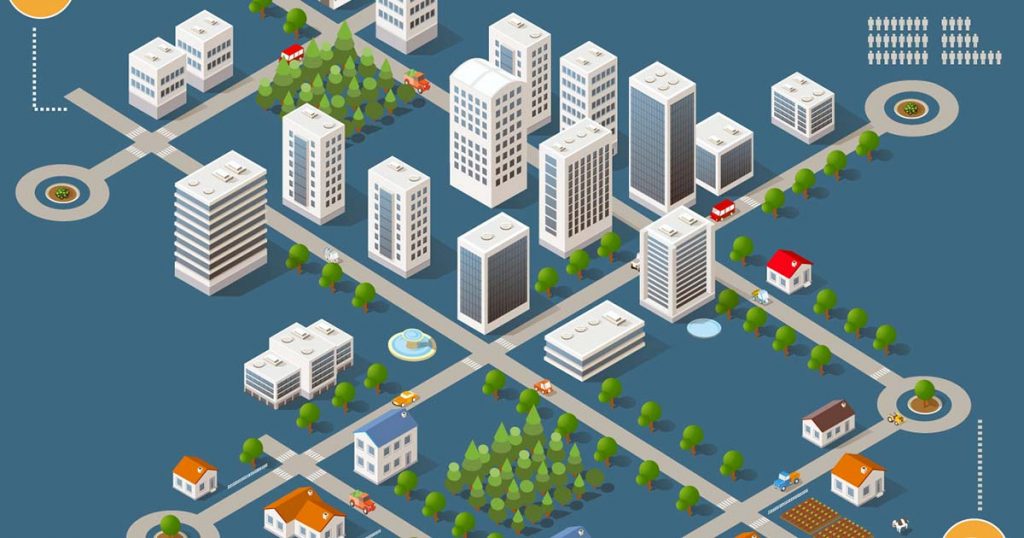Become a planner or upgrade your credentials with a 100% online degree.

A master's degree offers rigorous training and is suitable for both (a) people wanting to become city or town planners and (b) professionals already in the industry looking to upgrade skills and qualifications.
The premier qualification for planners is a Master of Urban Planning. Programs contain introductory, foundation subjects as well as advanced studies. Topics may include city redevelopment, spatial analysis, planning and environmental laws in Australia, urban design, and community engagement. Online courses allow you to study part-time as a working professional.
Develop Skills to Transform Communities

As a town planner, environmental manager, or policymaker, you will have the ability to shape city spaces and make a difference in people's lives. You will drive positive changes in resource management, strategic plans, and social amenities.
The quality of plans for urban environments is fundamental to our lifestyles and general standard of living. You can improve the impact and contribution you make. Build skills to take on multidisciplinary projects.
In Australia, urban planning is of immense importance since over 80% of Australians are either city residents or work in urban areas, or both. The main aspect that attracts such a large number of people to Australian cities has to do with the quality of life. - Archistar
Program participants gain broad perspectives on planning goals, the constraints and challenges, and how to bring stakeholders along with you. But you'll also develop specific skills you need as a planner and get plenty of practice in solving realistic problems.
Master of Urban Planning Online

Earning qualifications as a planner is convenient and efficient with an accelerated online program. Students work through weekly content together as a virtual class but with no specific time commitments. You complete subjects individually in sequence over 6-7 week study blocks. Assessment is continuous rather than exam based on you can study part-time online while working full-time.
What You'll Study (Course Structure)
Degrees for planners are broad in nature. Development projects vary and plans must satisfy numerous goals and constraints. Using case studies and simulated projects, you'll study different problems and learn to apply tools used in professional practice.
Key study topics include planning processes, design skills, sustainability issues, community engagement, local planning, and urban redevelopment.
Why This Degree Is Worth It

Embarking on an urban planner career can carry some risk because the job market is not especially deep. So, do your due diligence. However, urban and regional planner jobs are projected to grow, expanding by a forecast 8.3% over the five years to 2028.
The jobs are fascinating and rewarding, which is why the field is attractive. They include the design of new suburbs, coastal development, creating energy-efficient housing, and introducing new public transport services. You may work as a consultant or employee for local councils, state planning authorities, other government agencies, property developers and other private companies.
Planners balance many objectives and constraints in managing a project. These include aesthetics, functionality, social value, the environment, budgets, and regulatory compliance.
Generally speaking, the safest path is to study urban and regional planning after (i) you've gained qualifications and experience in a complementary field and (ii) can see job opportunities emerging for you based on talent. Complementary fields include architecture, engineering, business and environmental consulting.
Entry Requirements
The basic entry requirement is a university degree achieved with solid grades. For those lacking this, you can gain entry based on professional experience and non-degree postgraduate qualifications.
A Graduate Certificate course embedded in a master's program may provide an alternative pathway for those who don't automatically qualify for entry.
Pathway 1: A bachelor's degree or master's degree (or a UTS Graduate Certificate in Property Development or Graduate Diploma in Property Development) with a Credit average or above.
Pathway 2: No degree but a Graduate Certificate or Graduate Diploma with at least a Credit average in one of the following disciplines: architecture, landscape architecture, urban design and regional planning, environmental design, community development, property economics, property development, planning, geography, geographic information science (GIS), environmental science, law, economics. The applicant must also have 3+ years of experience in one of the above fields.
Pathway 3: Work experience in a profession closely related to urban planning and design amounting to at least 5 years for mid-career positions and 3 years for senior positions.
English language proficiency requirements apply if you're from a non English speaking background. Fully online courses are unsuitable for international students who are student visa holders.
Tuition fees are $4,169 per subject in 2023. FEE-HELP Australian Government loans are available to cover course costs.
How to Become a Planner in Australia

Competition for city and town planner jobs is high and, for many positions, a masters degree is almost essential. You're better able to compete for senior roles by holding appropriate postgraduate qualifications.
To be a successful planner, you may be advantaged by first getting a bachelor degree in architecture, business, engineering or urban and regional planning. The profession demands diverse skills and wide-ranging knowledge of planning considerations.
To gain full membership with the Planning Institute of Australia (which is optional for your career), you may need a 4-year professional degree, or a graduate diploma or master's degree in urban planning. Online study is the easiest way to build expertise and meet academic requirements for professional accreditation.
Related: How to Become a Town Planner in Australia
FAQs
In Australia, planners typically hold a bachelor's degree in urban and regional planning, geography, environmental studies, or a related field. But people from different education backgrounds can become planners.
University programs provide knowledge and skills to analyse and plan for the growth and development of cities and communities. They typically cover:
- Land use plans and zones
- Transportation plans
- Environmental plans
- Housing and community development
- Economic development
- GIS and spatial analysis
- Policy analysis and development
Students may also participate in fieldwork and internships, providing valuable hands-on experience in the field. In addition to their bachelor's degree, planners may also choose to do a master's degree. The postgraduate program offers more in-depth understanding of the discipline and may be required for some positions.
As with most professions, there are challenges with breaking into the field and getting a start on your career. Jobs as a city or town planner can be hard to come by. Gaining professional qualifications and experience is an important starting point, which is why a postgraduate education is almost essential.
Many different types of jobs are in the broad field of town planning. Being open to different kinds of job opportunities may greatly increase your career prospects. Once you've made a start, you can quickly establish a base of experience and solidify your position.
Urban planners specialise in areas such as community development, transportation, environmental management, design, and land use. Additionally, planners may work on projects ranging from small-scale neighbourhood plans to large-scale regional plans.
The main employers of town planners in Australia are government planning agencies and private consulting firms. Local and state government agencies create and enforce land use plans and policies, manage development applications, and provide advice to communities and developers.
Private consulting firms offer planning services to clients, including strategic plans, land use analysis, community engagement, and environmental impact assessments. These firms may work on projects for local, state, and federal governments, as well as private sector clients such as developers and property owners.

